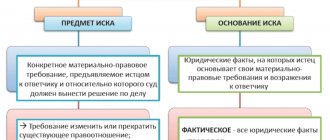Read about the grounds for eviction from a privatized, non-privatized, service or communal apartment on our website.
Initiators
Only a court has the right to forcibly deprive a citizen of the right to reside
What is the procedure regulated by? In its actions, the court relies on the provisions of Article 91 of the Housing Code of the Russian Federation.
Who can file an eviction? The initiators of legal claims may be:
- neighbours;
- municipality;
- state housing inspection.
Find out on our website also how to evict illegal residents, whom the owner has the right to evict from his apartment, and also whether the owner himself can be evicted for violating the rights of his neighbors.
Can anyone be forced to move out?
Not everyone can be deprived of the right to live in a municipal apartment. The legislation does not provide for the eviction of minors or people who are dependent on one of the tenants.
In the case of a person under 18 years of age, difficulties also arise with the eviction of the mother or father, or guardians living with him, since in fact they should be together. Therefore, if an adult is violating, and he has a child, it may also be impossible to take away the right to use the premises. In some cases, if there are good reasons for this, you can try to do this through deprivation of parental rights.
The question of in what cases and on what grounds it is possible to evict minors from residential premises was considered by us here.
Grounds and reasons
The court decision provides for the voluntary eviction of a person, and in case of refusal, the initiation of enforcement proceedings, i.e. transfer of the case to bailiffs.
The reason that a municipality files a lawsuit to deprive a citizen of social housing and terminate a social tenancy agreement may be the following situations:
- the house is intended for demolition as a dilapidated or unsafe building;
- the tenant intentionally damaged or destroyed the residential premises or this was done by persons for whose actions he is responsible;
- the tenant carried out the redevelopment without permission and does not restore the living space to its original condition, despite the requirement of the municipality;
- the tenant is absent from the registered address for a long time;
- the tenant resides illegally;
- the tenant does not use the living space for living, i.e. not on purpose;
- the tenant does not pay receipts for utilities and for renting premises for more than six months;
- the tenant or his family, by their behavior, makes it impossible for neighbors to live together in this apartment;
- the tenant has been deprived of parental rights and the court believes that he cannot live with the children.
Due to non-payment of mandatory payments, eviction involves providing the tenant with another smaller premises, for example, a dormitory. For other points, a citizen can be evicted without providing other housing.
In order to deprive an unwanted tenant of municipal housing, a lot of work will have to be done.
What is the procedure for eviction from public housing?
Legislation
Legal provisions apply to various situations of living in real estate under a social tenancy agreement. So, the main document is the Housing Code of the Russian Federation. Some of his articles concern:
- Art. 92 – about service housing, which, on the basis of Art. -100 is provided for use.
- Art. 83, part 4 – grounds for eviction.
- Decree of the Government of the Russian Federation No. 42 - on the termination of the tenant’s rights to live in a service apartment.
- Art. 84 – eviction of tenants and those registered by court decision.
- Art. 60 – term for concluding a social contract. hiring
- Art. 131 – form of claim for eviction.
- Constitution of the Russian Federation, art. 40 – about the right of citizens to housing.
- Art. 446 Code of Civil Procedure – eviction from an apartment.
Where to start, where to turn?
You need to start by collecting the so-called evidence base .
It is necessary to document the facts on the basis of which the tenant should be evicted from the apartment he occupies.
One complaint is not enough to make such a serious decision as depriving a person of a place to live.
First you need to contact the landlord:
- to the city government;
- to the municipality;
- to the municipal administration;
- to the structure that provides specific residential premises for social rent.
The landlord must take action against the lawbreaker and respond to the applicant within thirty days.
If the measures taken by him did not have the desired effect and the employer continues to violate the law, he will have to go to court.
Can they be evicted from municipal premises due to the departure of a tenant?
How to resubmit a claim - . Registration of a settlement agreement - .
Limitation period for filing a claim -
According to Part 3 of Article 83 of the Housing Code of the Russian Federation, a social tenancy agreement is considered terminated if the tenant and/or members of his family leave the municipal premises and do not live in it for a long time. Other residents can demand that citizens be removed from the apartment.
Forced deregistration is carried out exclusively through the court. Claimants must provide evidence of the long-term absence of the employer and/or his relatives.
Submission of documents
Each case is individual and the list of documents depends on the reason for which the plaintiff demands to expel the tenant from municipal housing:
- Impossibility of living together - at least two statements to the police are required with answers about the measures taken against the violator.
- Long-term absence - you will need an act indicating the time of absence from the place of residence, certified by the management company.
- Divorce - a copy of the divorce certificate or a copy of the court decision is required.
- In many cases it is necessary to resort to the support of witnesses . These could be employees of service organizations or government agencies, or neighbors. It is a common misconception that relatives cannot be witnesses - this is not true, they can also testify to the required facts.
- A social tenancy agreement confirming the legality of the plaintiff’s residence in the premises is attached to the claim in any case.
- An extract from the house register or a certificate of registered persons is also required for any claim.
Documents and a statement of claim must be submitted to the court of general jurisdiction at the place of residence.
You can file a claim yourself, guided by Articles 131 and 132 of the Code of Civil Procedure of the Russian Federation, but it is better to contact a qualified lawyer.
Correctly, without unnecessary emotions, a statement drawn up , supported by the necessary evidence, increases the likelihood of a positive consideration of the case by the court.
The process of eviction from public housing
This decision can only be made by a court. A person acting on behalf of the municipality or government authorities, as well as a tenant whose rights have been violated, are authorized to file a claim in court.
After receiving the statement of claim, an appropriate check is carried out. If the grounds are confirmed, the judge issues an order to evict the violators.
Tenants are subject to written notice of such a decision by the court. If they do not leave the premises of their own free will, bailiffs from the FSSP will be responsible for their forced eviction, implementing the court order.
If the municipality has provided tenants with other accommodation, citizens must move to the specified address in a timely manner.
Timing and cost
When filing a claim in court, payment of a state fee is required. In 2021, the state fee for a claim for expulsion from social housing is 300 rubles .
If the plaintiff wishes to use the services of a lawyer, then the cost of filing a claim and protecting his interests will depend on the individual prices of the specialist. Completely conducting a case without the participation of the plaintiff can cost several tens of thousands of rubles.
How long will it take? Practice shows that the expulsion of a tenant from municipal housing is a very long process and will take at least seven months:
- Reception and consideration of the case in court - two months (Article 154 of the Code of Civil Procedure of the Russian Federation).
- The issuance of a court decision and consideration of a cassation appeal takes two months (Articles 119 and 348 of the Code of Civil Procedure of the Russian Federation).
- Return of the case from the cassation instance and issuance of a writ of execution – one month (Article 428 of the Code of Civil Procedure of the Russian Federation).
- Enforcement proceedings in the case by bailiffs, expulsion of a citizen - two months (Article 36-FZ of October 2, 2007 No. 229-FZ “On Enforcement Proceedings”).
And this is with the “ideal” passage of the case through the authorities.
In practice, consideration of the issue may be delayed and the consideration of the case is constantly postponed to a later date due to insufficient evidence, requests for new papers, failure of the defendant to appear, appeal of the court decision, etc.
Where do they evict from an apartment for debt?
Failure to pay housing and communal services is the main reason for compulsorily vacating housing. According to the fourth part of Article 83 and Article 90 of the Housing Code of the Russian Federation, the tenant and his relatives may be required by the court to leave a municipal apartment if there is non-payment of housing and communal services and rent for six months or more.
In accordance with Article 84 of the Housing Code of the Russian Federation, depending on the grounds for eviction, citizens can count on receiving another living space that meets the same living conditions.
In some situations, the municipality may insist on leaving the apartment without providing other housing (for example, if property is damaged by tenants).
Refusal to consider
The case may be refused. When accepting the statement of claim and the documents attached to it, the judge determines whether all documents required by law have been provided .
If he identifies significant deficiencies in the statement of claim itself or in the attached documents, he may temporarily leave it without movement and set a deadline for making corrections.
If the comments are not corrected within this period, the judge has the right to refuse registration and return without consideration.
But this does not mean that the case is completely lost - the identified comments can be taken into account, eliminated and the claim can be filed again.
Where will the former tenant go?
Eviction can be carried out:
- without providing any place of residence;
- with the provision of a place of residence without amenities;
- with the provision of comfortable housing.
The law does not indicate the criteria by which the livability of the premises provided to replace the old one is assessed, saying only that the premises must be suitable for living with amenities “in relation to the conditions of the locality.”
Thus, in a regional city these may be some conditions, but in a rural settlement they may be different, much less favorable.
Features for certain categories of persons
Each case of forced deprivation of a citizen of municipal housing has its own nuances.
How does forced eviction work?
If a citizen does not comply with the court decision on eviction, then the case is transferred to enforcement proceedings.
In case of forced expulsion, the property remains with its owner; there is no forcible seizure or retention of it.
If the eviction occurs without the provision of other premises , then the property of the evicted person can be stored in specially equipped premises.
To ensure the execution of a court decision - the eviction of a tenant, bailiffs can involve any services to facilitate this: the Ministry of Emergency Situations, the police, etc.
This happens in cases where citizens interfere with the performance of their duties , and then bailiffs have the right to break down doors or demand that an aggressive resident be calmed down.
How to evict a person from a municipal apartment if he is not registered in it? In this case, there are no major legal problems in eviction. As trivial as it may sound, an unregistered person does not have the right to live in a place where he is not registered.
To resolve this issue, you can use three options:
- talk to an unregistered person about voluntarily moving out of the living quarters;
- file a complaint with the local police inspector with a request for forced eviction;
- go to court, and the bailiffs will evict such a tenant.
How does the eviction of a registered person take place? And is it possible to evict a registered person ? In order to evict a registered tenant from an apartment, he must be discharged from there.
Forcibly deregister a person, i.e. The only way to deprive him of his registration is through legal means. The following reasons may provide strong evidence
- a citizen has not paid bills sent to him for utilities or rental housing for more than six months;
- the citizen does not live in this premises for a long time.
Without the provision of other housing (apartment, place in a dormitory), a citizen may be evicted from municipal housing in the following cases:
- loss of the right to reside there;
- initially illegal residence in it.
However, if a citizen does not have the opportunity to settle in another room, for example, he does not have close relatives or he does not have sufficient income to rent housing, the judge may give him a deferment. The law does not allow someone to be forced to become homeless.
If unscrupulous neighbors interfere with your comfortable life, you can evict them from social housing for the following reasons:
- persistent antisocial behavior;
- violations of the rights of other neighbors;
- use of housing for other purposes;
- careless handling of the premises, due to which it may deteriorate or collapse.
Arbitrage practice
Before making a final decision to evict a person, the court gets acquainted with life circumstances, hears witnesses, studies expert opinions, and looks at archival data. It is far from certain that the owner will be able to evict a tenant who has nowhere to live or is experiencing financial difficulties.
Grounds when forced eviction is impossible:
- utility bills are overdue for less than 6 months;
- debt is associated with a difficult life situation (for example, layoffs at work, expensive treatment, the appearance of dependents);
- deterioration of health;
- retirement.
The examples below will show in which cases the courts evict with the provision of other housing, and in which they refuse new living space.
Example No. 1
The municipal house in the old part of St. Petersburg was in deplorable condition. Residents complained about roof leaks, rusty water, power outages and the threat of supporting structures collapsing. The examination revealed that the house was in disrepair. The assembled commission decided that the house was unsuitable for habitation, was a threat to the life and health of people, and therefore was subject to demolition. Resettlement took place over the next month. Residents of the building were evicted from their old apartments, but were given alternative housing in a new building. This approach complied with the provisions of Art. 85 of the Housing Code of the Russian Federation on the provision of housing after eviction from apartments.
Example No. 2
Verkhovtseva got married and gave birth to a daughter. The father did not show concern for the family, abused alcohol, argued with neighbors, damaged the property of a municipal apartment, and then even raised his hand against Verkhovtseva. The woman immediately contacted the guardianship authorities, who were convinced that the father was not fulfilling his duties and was creating a threat to the life and health of others. The case was brought to court - the father was deprived of parental rights in relation to his daughter. Since the family lived in a municipal apartment, the court decided to evict the father from the premises he occupied. At the same time, according to Art. 91 of the Housing Code of the Russian Federation, the evacuation of the rowdy occurred without the provision of other housing. Thus, the rule regarding the separation of the daughter and the father, who was deprived of parental rights, was fulfilled.
Who can't be evicted?
The law does not allow those registered in this premises to be left without a roof over their head or evicted without providing housing:
- minor children;
- orphans;
- dependents of a deceased employer;
- pensioners who retired due to age;
- disabled people of groups 1 and 2 who became disabled during the performance of official duties or military service;
- disabled people of groups 1 and 2 due to occupational disease;
- the family of a deceased or missing law enforcement officer.
To summarize all that has been said, it should be noted that eviction from municipal housing is, as a rule, a lengthy and very nervous procedure.
But if there are legal grounds for the expulsion of a citizen, strong evidence has been collected and a competent claim has been drawn up, then it will certainly end in success.
If you find an error, please select a piece of text and press Ctrl+Enter.
Erroneous interpretation of the rights of registered residents of a municipal apartment
| Erroneous point of view | Correct interpretation of the indicated situation using the norms of the Housing Code of the Russian Federation |
| The municipality has the right to evict any person registered in a state-owned apartment, except for the tenant of a state-owned apartment (landlord) | The rights and obligations of all persons registered in municipal housing, including the tenant, are equal to each other and are determined by the Housing Code of the Russian Federation. If there is a legal basis, any registered tenant can be evicted |
| No one can evict a minor from a government apartment | There are no separate benefits or additional rights for minors. They are evicted along with adults, but only with the involvement of guardianship authorities and the prosecutor |
| After divorce proceedings, none of the spouses can be evicted from a government-owned apartment. | After a divorce, only the tenant remains in the apartment if the housing was received by him before marriage and not acquired during a joint marriage, and also if there are no other agreements on this matter. The second spouse can then be evicted |








